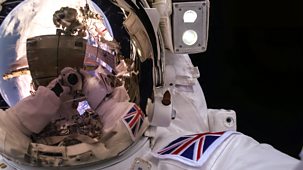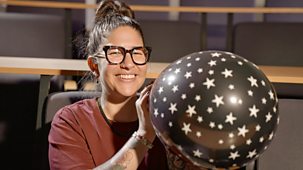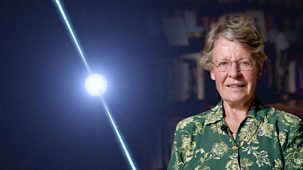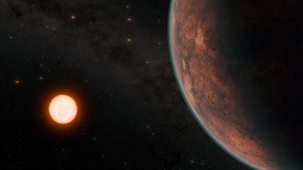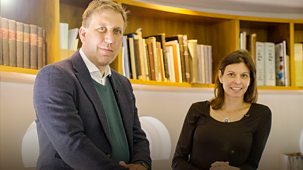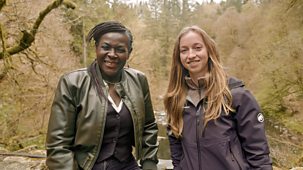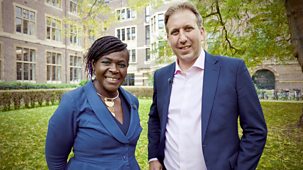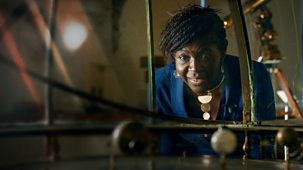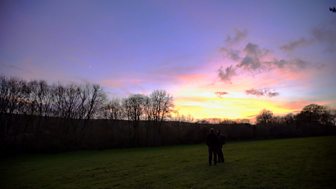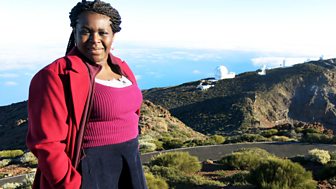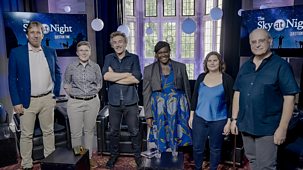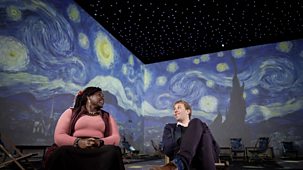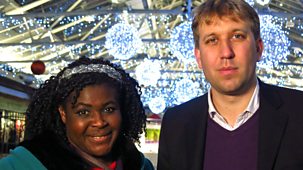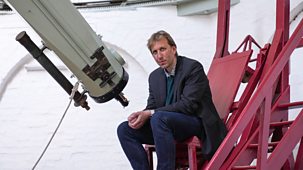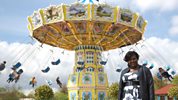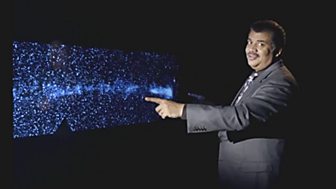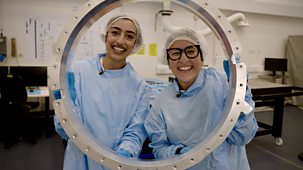
2075: Our Place in Space
The Sky at Night is embarking on a journey into the future as we explore how space will revolutionise life on Earth over the next 50 years. As humanity's reach extends into the cosmos, we face unprecedented challenges, from redefining what it means to be an astronaut to confronting our own space junk and dealing with the impact of life in space on our Earth-adapted bodies. With privileged early access to a groundbreaking new report from the Royal Society on humanity’s future in space, the Sky at Night team are on a mission to find our destiny among the stars – our place in space.\n\nThe criteria for becoming an astronaut are famously tough. But if we want more people to go to space, maybe it’s time to start challenging it. That’s what the European Space Agency are doing with their pioneering study Fly!, which aims to figure out if someone with a physical disability can live and work in space. At the European Astronaut Centre in Cologne, presenter Chris Lintott meets one of the newest members of ESA’s astronaut reserve: John McFall. John is already a medal-winning Paralympian and orthopaedic surgeon, and – as if that wasn’t enough – he is now the first recruit to the Fly! study. Chris discovers what’s involved in John’s extensive and gruelling training, and finds out what his hopes are for improving access to space.\n\nTraining for space travel is one thing, but living on the moon or Mars is a whole new level for humanity. Our bodies are used to gravity, and being in environments with less gravity than Earth can make them go a bit haywire. At the Royal Society in London, Maggie Aderin-Pocock meets up with space medicine expert Professor Kevin Fong to find out all about the challenges of keeping humans healthy in space. What would an astronaut on Mars do in a medical emergency? What happens to our bones, muscles and organs if we are without Earth’s gravity for a long time? And could a baby be born in space?\n\nWhile Maggie and Kevin unpack those mind-bending questions, George Dransfield heads to Astroscale in Oxfordshire, a company who are coming up with clever ways to take out space trash. There are already 130 million pieces of space debris in orbit around our planet, and that number is ticking up. George meets up with Dr Mekhi Dhesi to learn about Astroscale’s clever missions to clean up space junk – including ELSA-M, a spacecraft which uses magnets to tow defunct satellites out of orbit, and Cosmic, a spacecraft with a robot arm to grab onto debris.\n\nOur increasing dependence on satellites isn’t just producing a lot of space junk though, it’s also becoming a nuisance for amateur astronomers around the world. Thankfully, our resident astronomer Pete Lawrence has some clever tips and tricks for telling satellites and meteors apart, and using smart telescopes to remove satellite trails from deep sky images.\n\nFinally, back at the Royal Society, Maggie sits down with Professor Suzie Imber, planetary scientist and co-chair of the groundbreaking new Space: 2075 report. Together, they unpack some of the biggest questions about our journey into the cosmos over the next 50 years. How do we make sure space benefits us all, including those of us still down here on Earth? Should we be concerned about the commercialisation of space travel? And will there really be people on Mars by 2075?
Source: BBC 4
Most recent episodes of The Sky at Night
The Sky At Night
Space Mysteries: The Sky At Night Meets Curious Cases
Do aliens exist, and can we talk to them? What does a black hole sound like? Does the universe look like a doughnut? In a spectacular season finale, The Sky at Night teams up wi ...
13-11-2025
BBC 4
The Sky At Night
Brits In Space
Three, two, one, lift off! This edition launches into the extraordinary - and extraterrestrial - world of astronaut training, discovering what it truly takes to become a Europea ...
15-10-2025
BBC 4
The Sky At Night
The Expanding Universe
The team explores one of the greatest discoveries of modern astronomy - that our universe is expanding - and the new questions it raises about how the cosmos works.\n\nIn the 19 ...
10-09-2025
BBC 4
The Sky At Night
Queen Of Pulsars
Dame Jocelyn Bell Burnell is a discoverer and an explorer of the distant cosmos, and she has walked among the stars. She discovered the first pulsar in 1967 - a discovery so imp ...
14-08-2025
BBC 4
The Sky At Night
Exoplanets - Strange New Worlds
The team go on a cosmic adventure, exploring one of the newest areas of modern astronomy – the search for exoplanets, the distant bodies that orbit stars beyond our own so ...
16-07-2025
BBC 4
The Sky At Night
Greenwich: A Journey Through Space And Time
To celebrate the 350th anniversary of the Royal Observatory, the team recreate history. \n\nIn the times of the early Astronomers Royal, scientists would gather at spectacular d ...
12-06-2025
BBC 4
The Sky At Night
Secrets Of The Red Planet
Could life have once thrived on Mars? What mysterious force is moving large boulders across its dusty surface today? And will a return trip to our neighbouring planet ever be po ...
15-05-2025
BBC 4
The Sky At Night
Asteroid Strike?
The team explore one of the biggest stories in space news, the ‘city killer’ asteroid 2024 YR4. First observed on 27 December 2024, it soon became one of the biggest ...
17-04-2025
BBC 4
The Sky At Night
Ancestral Skies
This month, The Sky at Night teams up with BBC Ideas to discover the secrets of archaeology and astronomy and to reflect on our ancestral skies. \n\nThroughout history and acros ...
14-11-2024
BBC 4
The Sky At Night
Question Time Special
Get ready for The Sky at Night’s annual Question Time Special, where viewers get the opportunity to ask the questions they have always wanted answered about our universe.\ ...
08-10-2024
BBC 4
Most popular episodes of The Sky at Night
The Sky At Night
Wonders Of The Night Sky
The Sky at Night celebrates one of the most profound, moving and enjoyable activities there is - the ancient art of looking up, studying and marvelling at the night sky. The pro ...
10-12-2017
BBC 4
The Sky At Night
Telescope Takeover
The team travel to the island of La Palma in the Canary Islands where they take control of some of the world's largest telescopes to view the most spectacular sights in the nigh ...
12-02-2017
BBC 4
The Sky At Night
Question Time Special
A special Question Time edition of the programme, recorded at the University of Exeter as part of the British Science Association’s Science Festival.\n\nThe panel is chair ...
12-10-2023
BBC 4
The Sky At Night
Dark Skies
Dr Maggie Aderin-Pocock and Professor Chris Lintott visit the Van Gogh Immersive Experience to seek inspiration in one of the world’s most famous works of art, Starry Nigh ...
12-01-2022
BBC 4
The Sky At Night
Mapping The Milky Way
The Gaia space telescope is not just create the ultimate star map of the Milky Way. It is also showing us our galaxy's past and how it will change in the future.\n\nThe Sky at N ...
12-05-2021
BBC 4
The Sky At Night
How Gravity Shapes The Universe
The team travels to the Brecon Beacons AstroCamp to see how gravity shapes the universe. Chris finds out about the newest moon in the solar system.
18-05-2014
BBC 4
The Sky At Night
The Brightest Star
The team explore stargazing in the daytime, show how seasons change on other planets across the solar system and examine what makes the sun special.
13-07-2014
BBC 4



